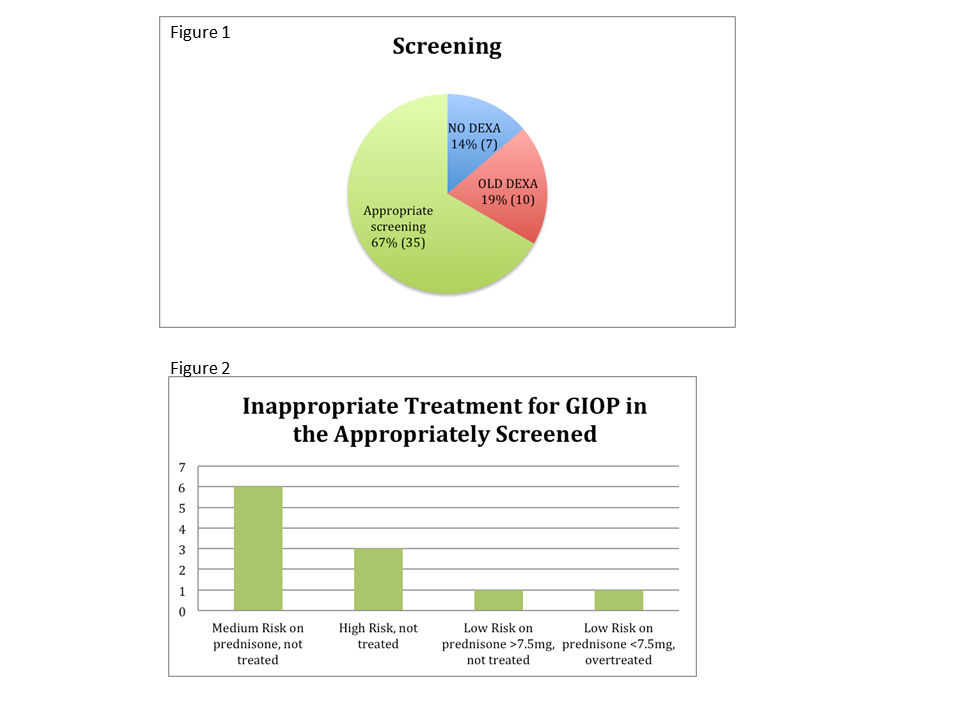Session Information
Date: Sunday, November 8, 2015
Title: Osteoporosis and Metabolic Bone Disease - Clinical Aspects and Pathogenesis Poster
Session Type: ACR Poster Session A
Session Time: 9:00AM-11:00AM
Background/Purpose:
Glucocorticoids are effective at treating rheumatologic diseases but are known
to increase fracture risk. In 2010, the ACR developed recommendations for
the prevention and treatment of glucocorticoid induced osteoporosis (GIOP) based
on risk factors, FRAX score, and prednisone dose. The purpose of this
study is to evaluate compliance with the ACR GIOP recommendations in a large
teaching institution.
Methods:
Men and women seen at the fellows’ general rheumatology clinic at
Montefiore Medical Center (Bronx, NY) who were ≥50y with history of rheumatoid
arthritis between 1/2015 and 2/2015 were included. Charts were reviewed for
DEXA Screening within 2 years of visit and appropriate bisphosphonate usage
based on the risk stratification proposed by the ACR.
Results:
52 patients were evaluated. 92.3% were women with a mean age of 66.5 years.
In this cohort, 13.5% were Black. Only 67% of the patients were appropriately
screened with an up to date DEXA (Figure 1). Patients that were not screened
tended to be younger (62.6 v 67.2, p=0.08). Also male patients were less likely
to be screened (6.6% v 14.3%). There was no statistically significant
difference in screening in women or by race. Out of the 35 patients that were
appropriately screened, 32% were not appropriately treated (figure 2). 6 of
these 11 patients were candidates for treatment due to being medium risk and on
prednisone. 3 of 11 were candidates for treatment due to their osteoporotic T-score.
One patient was low risk but was on prednisone 7.5mg and warranted
treatment. Another patient was low risk on prednisone 5mg daily but was inappropriately
on a bisphosphonate.
Conclusion:
Overall, 53% of the patients in our academic institution were not appropriately
screened or treated for GIOP. Although not statistically significant, RA patients that were not effectively
screened tended to be patients of younger age and male. This study concludes
that rheumatologists underutilize osteoporosis screening and preventative
treatment, which is prudent toward preventing debilitating fractures and its
subsequent impact on diminished quality of life. Provider education on
screening and treatment of GIOP may be an area for quality improvement for both
primary care and rheumatology.
 |
To cite this abstract in AMA style:
Ogando S, Santana C, Blanco I, Mendez B. Osteoporosis Screening and Treatment of Rheumatoid Arthritis Patients at a Teaching Institution [abstract]. Arthritis Rheumatol. 2015; 67 (suppl 10). https://acrabstracts.org/abstract/osteoporosis-screening-and-treatment-of-rheumatoid-arthritis-patients-at-a-teaching-institution/. Accessed .« Back to 2015 ACR/ARHP Annual Meeting
ACR Meeting Abstracts - https://acrabstracts.org/abstract/osteoporosis-screening-and-treatment-of-rheumatoid-arthritis-patients-at-a-teaching-institution/
